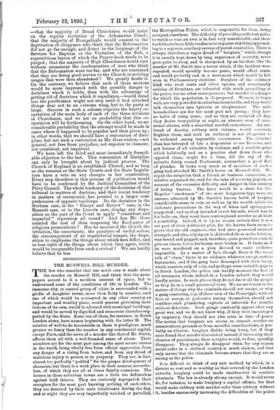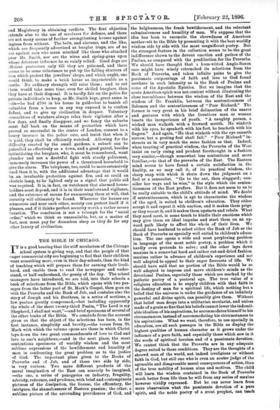THE MUSWELL HILL MURDER. T HE few who consider that too
much Lass is made about the murder on Muswell Hill, and think that the news- papers accord to it a needless amount of space, fail to understand some of the conditions of life in London. The immense city, or central group of cities, is surrounded with a girdle of daughter towns, more than forty in number, each one of which would be accounted in any other country an important and wealthy place, would possess governing insti- tutions of its own, would be adorned with municipal buildings, and would be served by dignified and numerous churches sup- ported by the State. Some ten of them, for instance, in North London alone, have names beginning with the letter H. The number of well-to-do households in them is prodigious, much greater we fancy than the number in any continental capital, except Paris, and the news of a murder like that of Mr. Smith, affects them all with a well-founded sense of alarm. Their members are for the most part among the most secure classes in the world, being wholly free from official oppression, from any danger of a rising from below, and from any dread of malicious injury to person or to property. They are, in fact, almost too perfectly " podded " for the proper development of character, but there is a weak place in their armour, neverthe- less, of which they are all at times faintly conscious. The houses in these suburban towns are a little too defenceless against bold thieves. They are curiously segregated, their occupiers for the most part knowing nothing of each other, they are deserted by their male inhabitants during the day, and at night they are very imperfectly watched or patrolled, the Metropolitan Police, -which is responsible for them, being occupied elsewhere. The difficulty of providing sufficient police to watch so vast an area is in fact very considerable, and there has hitherto been little readiness to organise anything approach. ing to a separate auxiliary service of parish constables. There is always, therefore, a vague dread of "burglars," which, though it is usually kept down by long experience of security, never goes quite to sleep, and is sharpened by an incident like 'he murder of Mr. Smith into a terror which, if the incident were repeated, would speedily become panic, would affect rents, and would probably end in a movement which would be felt even in Parliamentary elections. Burglars of the ordinary kind who steal coats and silver spoons, and occasionally articles of furniture, are tolerated with much grumbling at the police, but no other consequences; but murder is a danger for which the population is ill-prepared. Women, to begin with, are very powerful in suburban households, and they would talk themselves into hysteria or sleeplessness. The male householders are for the most part not young ; they have no habit of using arms ; and as they are occupied all day, they desire tranquillity at night, an absence even of occa- sional alarms, with a somewhat morbid earnestness. An out- break of dacoity, robbery with violence, would seriously frighten them, and such an outbreak is not altogether to be reckoned ..mong impossible occurrences. The criminal class has betrayed of late a disposition to use firearms, and gut houses of all valuables by violence, and a resolute gang which habitually and as a practice shot down those who opposed them, might for a time, till the cry of the suburbs fairly roused Parliament, accumulate a good deal of plunder. It looks very much as if members of such a gang had attacked Mr. Smith's house on Muswell Hill. We reject the suspicion that a friend, or business connection, or relative organised the raid for the sake of securing papers, on account of the excessive difficulty and danger in this country of hiring bravoes. The hirer would be a slave for life. Regular " crackemen " of the more dangerous type were, we assume, attracted by Mr. Smith's known habit of keeping considerable sums in coin, as well as by the wealth which his elaborate precautions in the way of wires and spring-guns suggested ; and as they intended to rob his safe, which was in his bedroom, they must have contemplated murder as at least a possibility. Indeed, it is by no means certain that it was not part of their deliberate plan, for the known facts seem to prove that the old engineer, who had once possessed unusual strength, and who, relying on it, disturbed them in the kitchen, was bound and gagged, and, therefore, quite powerless even to give an alarm, before his brains were beaten in. It looks as if he were murdered on a plan devised to make evidence impossible. As a matter of fact, though there is the usual talk of "clues," there is no evidence whatever except certain footmarks ; and if the gang have decamped with their booty, which consists only of coin, and perhaps some valuable papers to South London, the police can hardly measure the feet of all strangers, whom, indeed, in a London suburb they would hardly notice. In such places they do not know all the people as they do in a small provincial town. We see no reason in the nature of things why the criminals should not escape, or why a gang consisting, say, of three men of the Peace type, without fear, or mercy, or jealousies among themselves, should not continue such plundering exploits at intervals for months without detection. Such gangs constantly appear after any great war, and we do not know why, if they were encouraged by impunity, they should not also arise in time of peace. The notion that burglars are averse to commit murder on conscientious grounds or from merciful considerations, is pro- bably an illusion ; burglars dislike being hung, but if they once found that murder diminished instead of increasing their chances of punishment, their scruples would, we fear, speedily disappear. They always do disappear when for any reason social order in a civilised country is much shaken, and that only means that the criminals become aware that they are as strong as the police.
It is difficult to think of any new method by which, in a district so vast and so wealthy as that covered by the London suburbs, burglary could be made unattractive to resolute criminals. The law is already strong enough. It would never do, for instance, to make burglary a capital offence, for that would make robbery with murder safer than robbery without it, besides enormously increasing the difficulties of the police and Magistracy in obtaining verdicts. The first objection extends also to the use of revolvers for defence, and there ire not many means of further strengthening houses against ingress from without. The bells, and alarums, and the like, which are frequently advertised as burglar traps, are of no use against men who mean mischief like those who attacked poor Mr. Smith, nor are the wires and spring-guns upon whose deterrent influence he so vainly relied. Good dogs are afficient protectors only till they are poisoned, and there seems to be some reluctance to put up the falling shutters of iron which protect the jewellers' shops, and which ought, one would think, to make a brick house as impenetrable as a castle. No ordinary strength will raise them ; and to cut them would take more time, even for skilled burglars, than they have at their disposal. It is hardly fair on the police for private individuals to keep, as Mr. Smith kept, great sums in .oin—he had £700 in his house in gold—but to banish all valuables from a house in any way exposed is to confess defeat, and to give up civilisation in despair. Voluntary committees of watchers always relax their vigilance after a few days, and finally disappear, and we fancy the suburbs must fall back on the means of protection which have proved so successful in the centre of London, consent to a heavy increase in the police rate, and insist that when it is paid, they shall be efficiently watched. Allowing for the difficulty created by the small gardens, a suburb can be patrolled as effectively as a town, and a good patrol, besides intimidating the burglars, who, it must be remembered, want plunder and not a doubtful fight with sturdy policemen, Immensely increases the power of a threatened household to give the alarm. The telephone, too, could be more extensively used than it is, with the additional advantage that it would be an invaluable protection against fire, and so could an electric lamp, to be lighted only as a signal that public aid was required. It is, in fact, on watchmen that alarmed house- holders must depend, and it is in their numbers and vigilance, and the existence of means for summoning them at will, that security will ultimately be found. Wherever the houses are numerous and near each other, society can protect itself if it pleases, and if it thinks perfect security worth a rather severe taxation. The conclusion is not a triumph for the "social order," which we think so unassailable, but, as a matter of fact, men must pay for dreamless sleep as they do for any other luxury of civilisation.



































 Previous page
Previous page